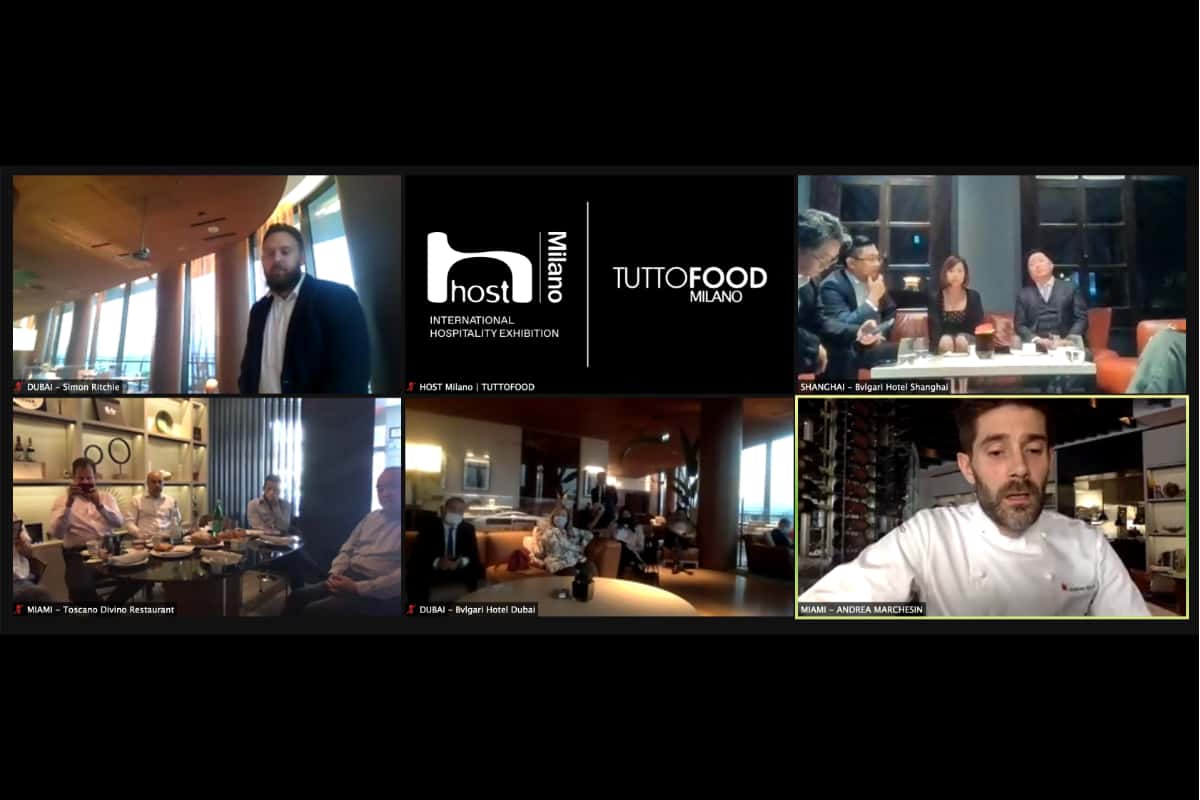Two leading F&B and Hospitality global exhibitions, HostMilano and TUTTOFOOD Milano, organized an international conference on sustainability that included online and in-person events at four luxury destinations: Miami, Milan, Shanghai and Dubai. The event was held with the patronage of the Italian Trade Agency and in collaboration with the Italian Business Council Dubai and the Shanghai Chamber for International Commerce.
The conversation, broadcasted worldwide, looked into the compelling topic of sustainability from a very specific perspective: how the luxury segment of the F&B and Hospitality industry is working to improve environmental sustainability.
Nine prominent stakeholders in the food and beverage and hospitality industry that everyday strive to offer their customers top of the range products and services, gathered in their cities to discuss their experience and current projects aimed to improve sustainability in their daily operations.
From the unique setting of the Li Xian Bao restaurant at Bulgari Hotel Shanghai, Architect Paul Tse of L&T Architecture described how sustainability in architecture is not just reusing materials such as marble and timber, but go beyond even to the “recycling” of a complete building, keeping the high-end materials and structures while redesigning key elements to make it a boutique hotel. Also, a first-class cabin design that exchange seat size for more ample and airy spaces.
Mr. Philip Wei, a leading Chinese hotelier, explained how WEI hotels incorporate elements of the Chinese tradition and culture to maintain balance between nature and human beings, focusing the attention of all aspects of sustainability.
From the Yacht Club Lounge of the Bulgari Hotel in Dubai, Mr. Omar Mohammed explained how thehigh-end international retail operations of Jones The Grocer have selected a series of food products from self-sustaining farms from different parts of the world paying special attention to the production of ingredients and of the packaging. In fact, some of their products feature 100% biodegradable packaging and 100% plant-based ingredients, i.e. for healthy ice cream and beverages.
In the same way, Mr. Marco Rosa of the distribution company Longino & Cardinal, described importantinitiatives implemented to assure traceability of the ingredients that their key accounts, such as Michelin starred hotels, can offer to their customers.
In Milan, Bulgari Hotel’s Senior Director Mr. Attilio Marro, described the four pillars of their sustainability program: going plastic free by the end of 2020, optimization of food ingredients sourcing prioritizing local produce and healthy and organic food, energy saving using solar panels and motion sensors, and CSR programs through a partnership with Save the Children worldwide.
Ms. Simona Finessi, director of Platform Architecture and Design, shared the insights and personaltestimony on sustainability of some of the most famous Italian architectural studios. Carlo Colombo thinks that “respect for the environment, traceability of the supply chain, absence of exploitation of the planet and of the workforce, today represent the fundamental criteria that guide consumers’ choices and an essential value for the brand equity of any company operating in luxury”.
For Matteo Nunziati “sustainability is responsibility”. And according to Paolo Castelli, “sustainable luxury, that for years seemed to be an oxymoron, has become a contemporary trend!
From the Toscana Divino Restaurant in Miami, one of few top restaurants in the city that explicitly callitself sustainable, Mr. Dieter Xiao, Corporate Restaurant Operations and Development Manager at Norwegian Cruise Line, highlighted the importance of the leadership of the luxury segment in sustainable process because of its visibility and credibility among a wide range of stakeholders that follow their example.
Chef Andrea Marchesin has long been a proponent of farm-to-table and sustainable food. He explained how the chain of restaurants he supervises in Miami has now establish as a rule to work only with farms and suppliers that recycle their waste aiming to reach 0 food waste operations.
Finally, Tommaso Cardana, director of Tomson Hospitality, reiterated how the luxury segment isembracing more and more the concept of sustainability. He offered the example of a project hepersonally developed introducing purified water to replace bottled water on a cruise line. This changebrought a net saving of 3 million plastic bottles in one year. The impact of the saving should bemeasured not only in terms of reduced plastic consumption but also in the lower carbon footprint related to the transportation of such a large amount of bottles around the world.
The consensus in very clear: sustainability is not just a fashionable concept destined to vanish, it is going to be a pillar in the F&B and hospitality industry for the foreseeable future.
Sustainability is not a concept related to savings, unpleasant packaging, no-tasty food… The world of luxury is seriously and actively working to improve the sustainability of their operations and their products and has been already obtaining noticeable results.
Finally, sustainability is one concept that can bring together the whole world, from East to West, passing through Europe and the Middle East: sustainable and luxurious food, beverage and hospitality services are here for us to appreciate and it should be a standard for the industry.

